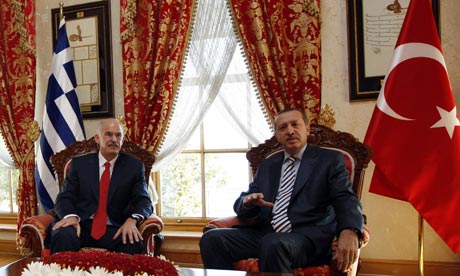Regional foes Greece and Turkey signed dozens of agreements which seek to promote economic, tourism and business cooperation in Athens Friday and agreed to hold joint cabinet meetings twice a year, DPA reported.
"I am optmistic that the steps taken today can bring results, namely because the will exists," Greek Prime Minister George Papandreou said during a joint news conference with Turkish Prime Minister Recep Tayyip Erdogan.
Erdogan's visit to Greece, the first by a Turkish prime minister since 2004, involved a 400-strong delegation which included 10 ministers and roughly 150 businessmen.
Erdogan and Papandreou also presided over a joint cabinet meeting, a first between the two countries and launched a series of annual meetings in the framework of a high-level cooperation council that will alternate between the two countries.
The two sides signed 21 bilateral agreements on issues ranging from transport, education, energy, environment to curbing illegal migrants coming through Turkey which is a major problem for Greece.
"The large number of agreements is proof of the historic nature of this visit," said Papandreou.
Athens and Ankara also agreed to work together to promote both countries as a joint destination for Chinese tourists and agreed to advance a gas pipeline project that links Turkey, Greece and Italy.
Erdogan said he wanted to see both countries advance in the area of bilateral trade and reach targets of 5 billion euros, roughly double of what exists today.
The two countries, which have come close to war three times - have seen a gradual thaw in relations since twin earthquakes in 1999, resulting in a mutual outpouring of support.
Although relations improved considerably following the earthquakes, the momentum wore off and relations still remain tense over territorial disputes in the Aegean as well as differences over the divided eastern Mediterranean island of Cyprus.
Ankara has also complained that Athens neglects the rights of the Turkish minority living in northern Greece.
With Greece facing a massive 300-billion-euro debt and a lack of foreign investment, Erdogan promised to support Athens' efforts towards financial recovery.
Greece became the first eurozone country to resort to the International Monetary Fund for aid, receiving a giant bailout from the European Union and the IMF totalling 110 billion euros (138 million dollars) in return for harsh budget cuts and austerity measures that have set off a wave of protests.
Greece spends more of its gross domestic product (GDP) on defence than any other European country, largely due to the long-standing tension with Turkey, something both countries said should change.
"I feel a national shame every time that we are forced to buy weapons that we do not need based on the threat that exists in today's world and as it holds for Greece," said Deputy Prime Minister Theodoros Pangalos.
"I know that Turkey also purchases weapons that it does not need - due to an imaginary threat that arises form a political confrontation which can be solved and must be solved."
Security was tight for the Erdogan's visit as more than 1,500 riot police were deployed throughout Athens. Riot police briefly clashed with angry protesters using tear gas to keep them back from marching towards the Turkish embassy.






